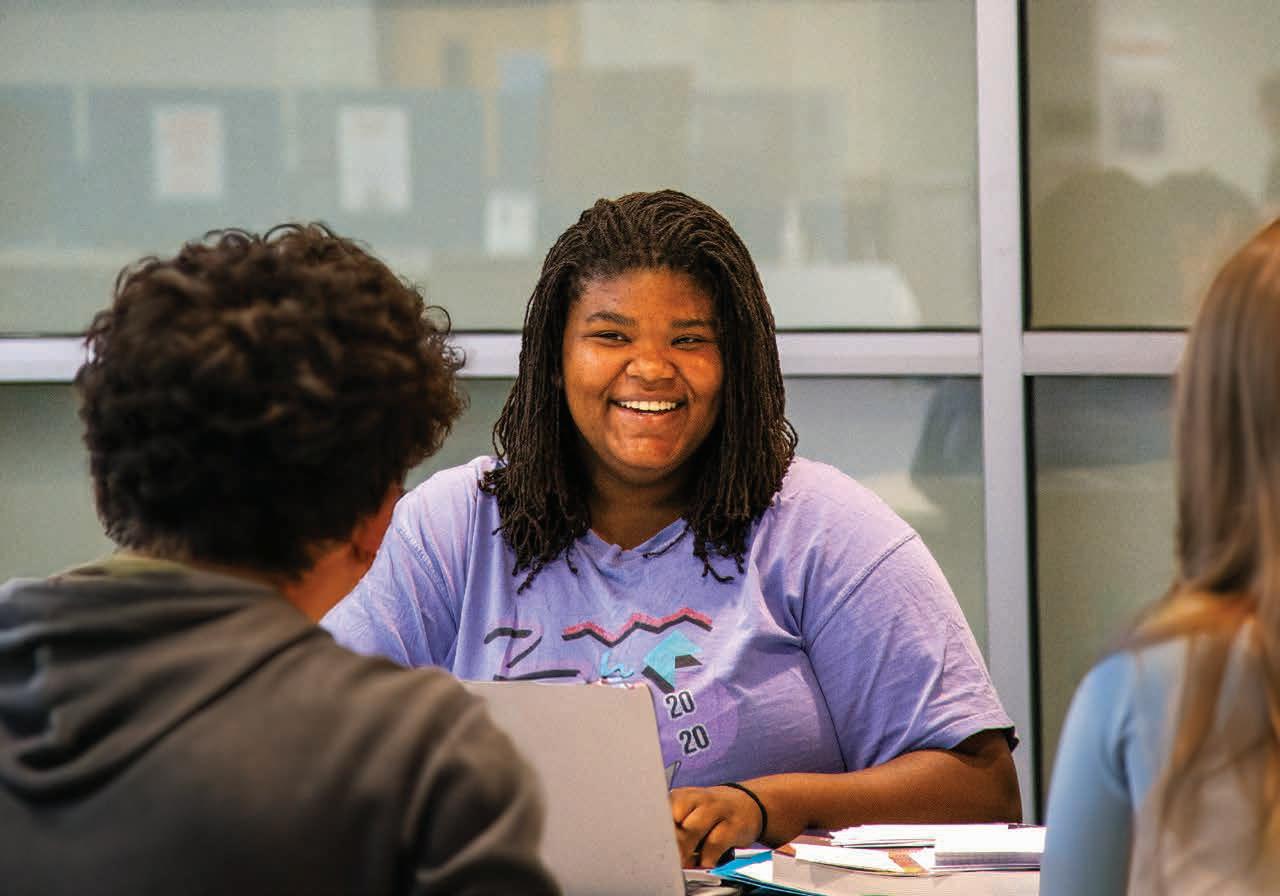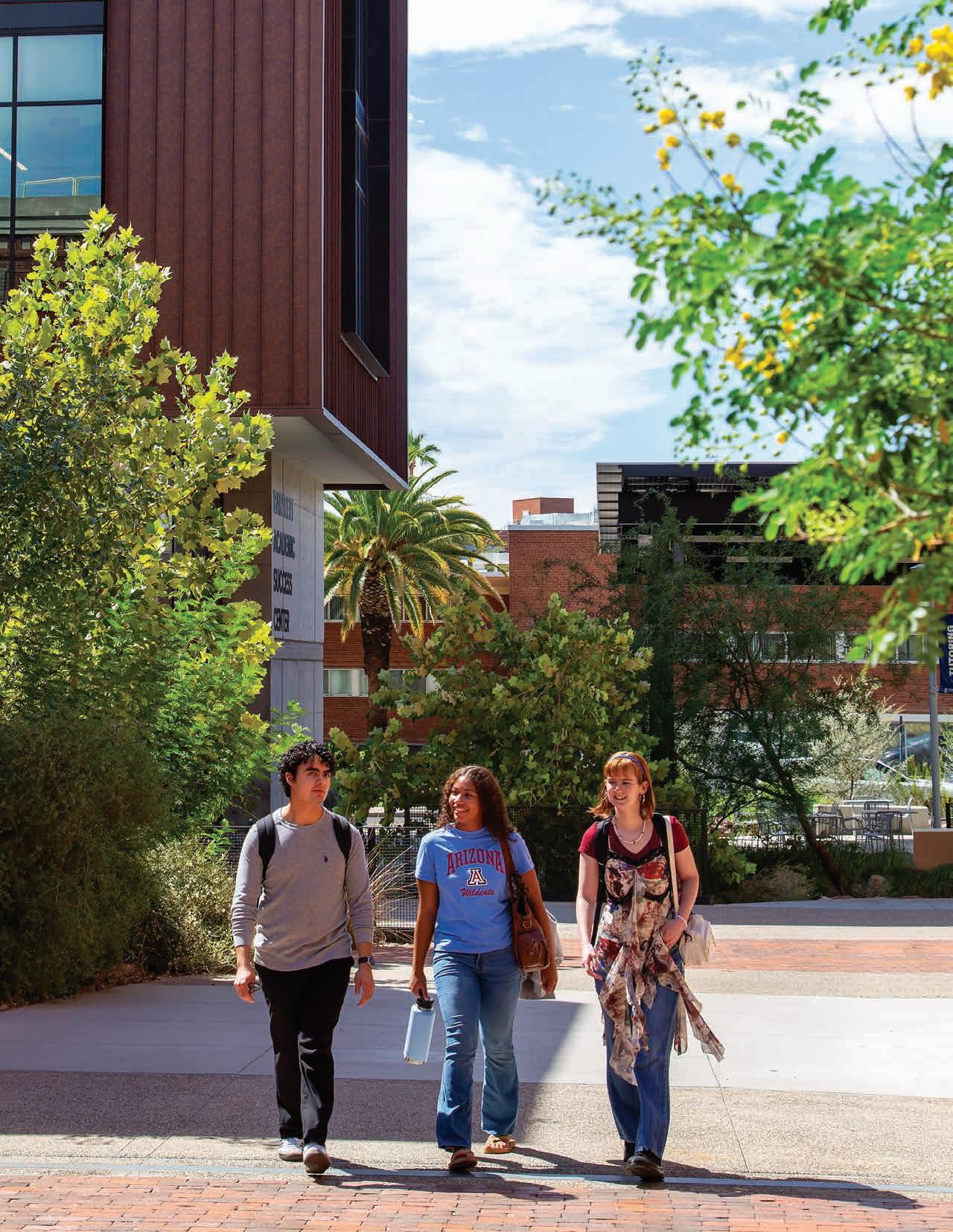

TABLE OF CONTENTS SALT CENTER TEAM
Welcome from the Bartlett Family Executive Director
Supporting the Journey of Everyday Self-Advocacy
Courage and Commitment: Meet the 2025 Michelle Combs Award Winners
Passing the Torch: A Tutoring Program Lead by Those Who’ve Been There
Empowering Potential: The Critical Role of Scholarships for Special Education Students with Financial Need
Exploring Educational Technology with Mary Beth Eustice
Mari White: 2025 David Livingston White Award Winner
Pushing Forward: Gabby’s Journey On & Off the Field
Celebrating the Class of 2025: Photos from our Spring Graduation Reception
Fighting for Myself: Bailey Hennessy’s Graduation Message
©2025-26 The Arizona Board of Regents on behalf of the University of Arizona
Designed and produced by West Press for the SALT Center
Editor: Isaac Flater
Contributors: Marcela Delgado, Mary Beth Eustice, Isaac Flater, Jennifer Hansen, Bailey Hennessy, Sarah Kirshbaum, Daniel Linden III, Gabrielle Miller, Richard St. Clair, Roxana Samaniego, Lupe Thompson
Layout & Design: Elexis Hernandez
Photography: Isaac Flater, except where otherwise noted
Executive Director’s Office
Gabrielle Miller, Ed.D.
Daniel Linden III, M.A., M.S.
Marcela Delgado, M.Ed., MBA
Alexandria Valencia
Isaac Flater
Emily Fuchs, M.A.
Bartlett Labs
Laurel Grigg Mason, Ph.D.
Shawnda Garcia, M.Ed.
Matt Swanson, M.Ed.
Jessica Beauchesne, M.P.A.
Admissions
Sarah Sampe, M.Ed.
Brittany Cortinas
Student Support
Claudia Sandoval, M.S.W.
Abigail Entrican
Richard Fimbres, M.Ed.
Heather Gallivan, M.Ed.
Taylor Gillis, M.Ed.
Jennifer Hansen, M.Ed.
Jackie Aguirre
Ann Conway, M.Ed.
Kim Matharoo
Caroline Ragano, M.Ed.
Emily Schottler, M.Ed.
Richard St. Clair
Melissa Thach
Lupe Thompson
Learning Support
Blake Cesarz, M.M.
Mary Beth Eustice, M.A.
Stephen Ferris, M.A.
Sarah Kirshbaum
Jessica Stansel, M.A.
Clinical Services
Roxana Samaniego, Ph.D.
Laura Kerry-Henkel, Ph.D.
Charlotte Iurino, Ph.D.
Estrella Ochoa, Ph.D.
Victoria Orantez
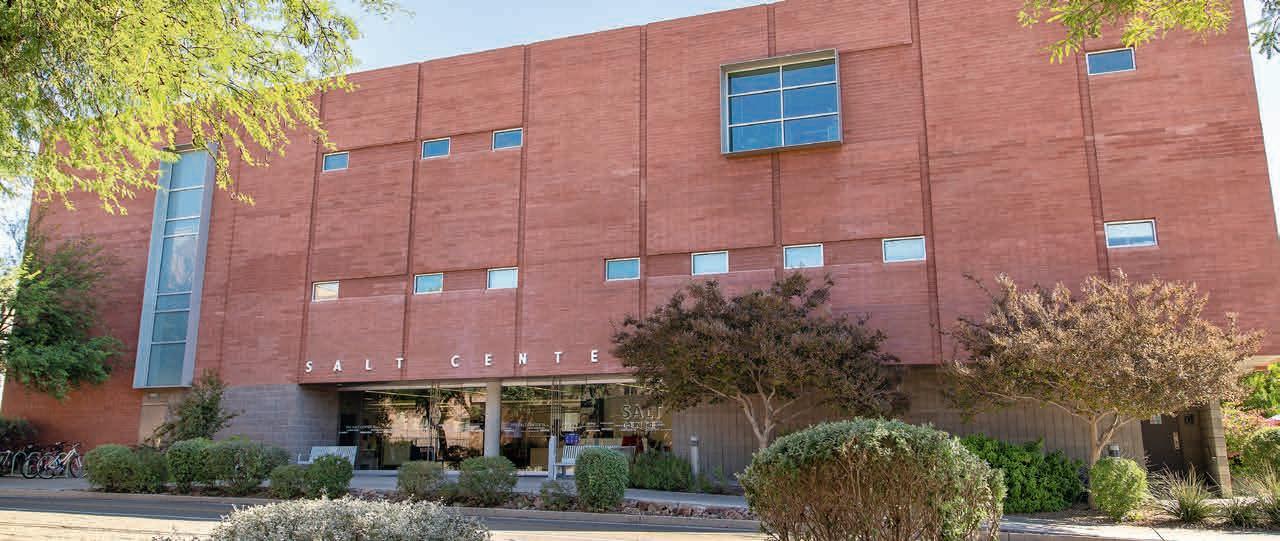
WELCOME FROM THE BARTLETT FAMILY EXECUTIVE DIRECTOR
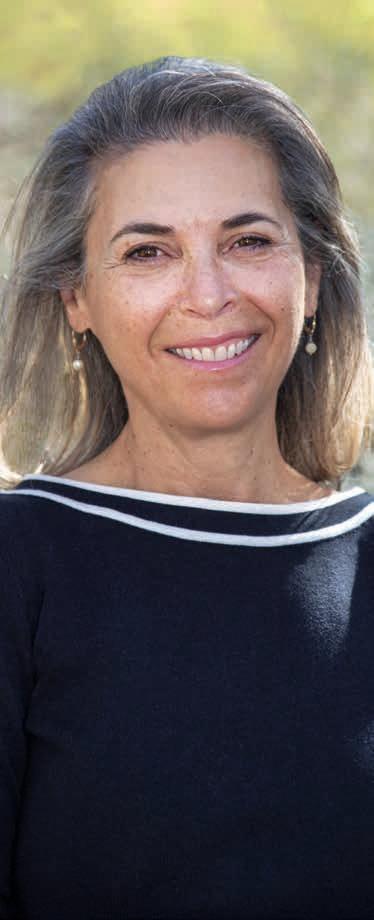
When Dr. Eleanor Harner started this program 45 years ago in the basement of Old Main, her primary goal was just to help a handful of struggling students who had fallen through the cracks. As time went on, however, Dr. Harner began to realize the potential the fledgling program had to make a greater impact on these learners. With the help of administrators, parents, and others, she set the program on a path to become what it is today: an international leader in providing individualized support to university students who learn differently as they make their way through this critical and often tumultuous stage of life.
With over 600 students in Tucson, two on-campus locations, and support available to in-person, distance, and online learners, the SALT Center’s impact has expanded into something no one could have ever imagined possible back in 1980.
Just as the program has developed with visionary leadership and support, so can the students enrolled in our program. Every day, we work with students to help them take ownership of their lives and feel empowered to pursue their dreams and passions. This ongoing process is full of trial and error, but as students learn to trust us, they soon realize that we are on their team and here to help them become more confident and independent adults.
In this edition of the Journal, you'll read about students who have overcome incredible hardships and the valuable lessons they learned along the way. You’ll also learn about how our comprehensive support services contribute to that growth. Our dedicated team of Student Support Specialists, Tutors, Psychologists, Educational Technology Consultants, and others, work together to help meet students where they’re at and provide them with the tools they need to thrive.
Every year, I hear from alumni and their families about how the SALT Center not only contributed to their academic success in college, but also helped them develop the skills, self-confidence, and growth-mindset they needed to weather the storms of life. Our graduates know how to bear down and push through when things get tough. They know that it’s okay to ask for help when they need it. They know that mistakes and failures do not define them. And perhaps most importantly, they know that they can do hard things.
Lastly, thank you to every member of the SALT Center family, especially those supporters who believe in our students and invest in their potential. We couldn’t do this work without you!
Bear Down!
Gabrielle Miller, Ed. D.
SUPPORTING THE JOURNEY OF
EVERYDAY SELF-ADVOCACY
ROXANA SAMANIEGO, PH.D. Director of Clinical Services
As students transition from high school to college, their journey toward independence and self-advocacy becomes increasingly important. Families and supporters played a critical role in helping students reach college, by advocating, seeking help, and offering encouragement when needed. Families and supporters continue to play a vital role in helping students build the skills they need to thrive—not just academically, but socially and professionally. However, now the challenge is supporting their student in advocating for themselves. A number of different researchers over the years have demonstrated time and again that students with disabilities who masters skills around self-advocacy, particularly understanding their needs and seeking support, are more likely to persist and succeed in college (e.g., Adams & Proctor, 2010; Getzel & Thoma, 2008; Daly-Cano, Vaccaro & Newman, 2015).
At the SALT Center, we frequently talk with students about “everyday” self-advocacy, which are the small-scale, daily behaviors that help them access what they need. These everyday tasks, like talking to a professor about a need or speaking up to their friends when they need to access a space differently, may be small in scale, but are no less critical to their development and to their success in college. We can talk about the development of everyday self-advocacy occurring in three stages:
LEVEL 1
Emerging Self-Advocacy (High School/Teen)
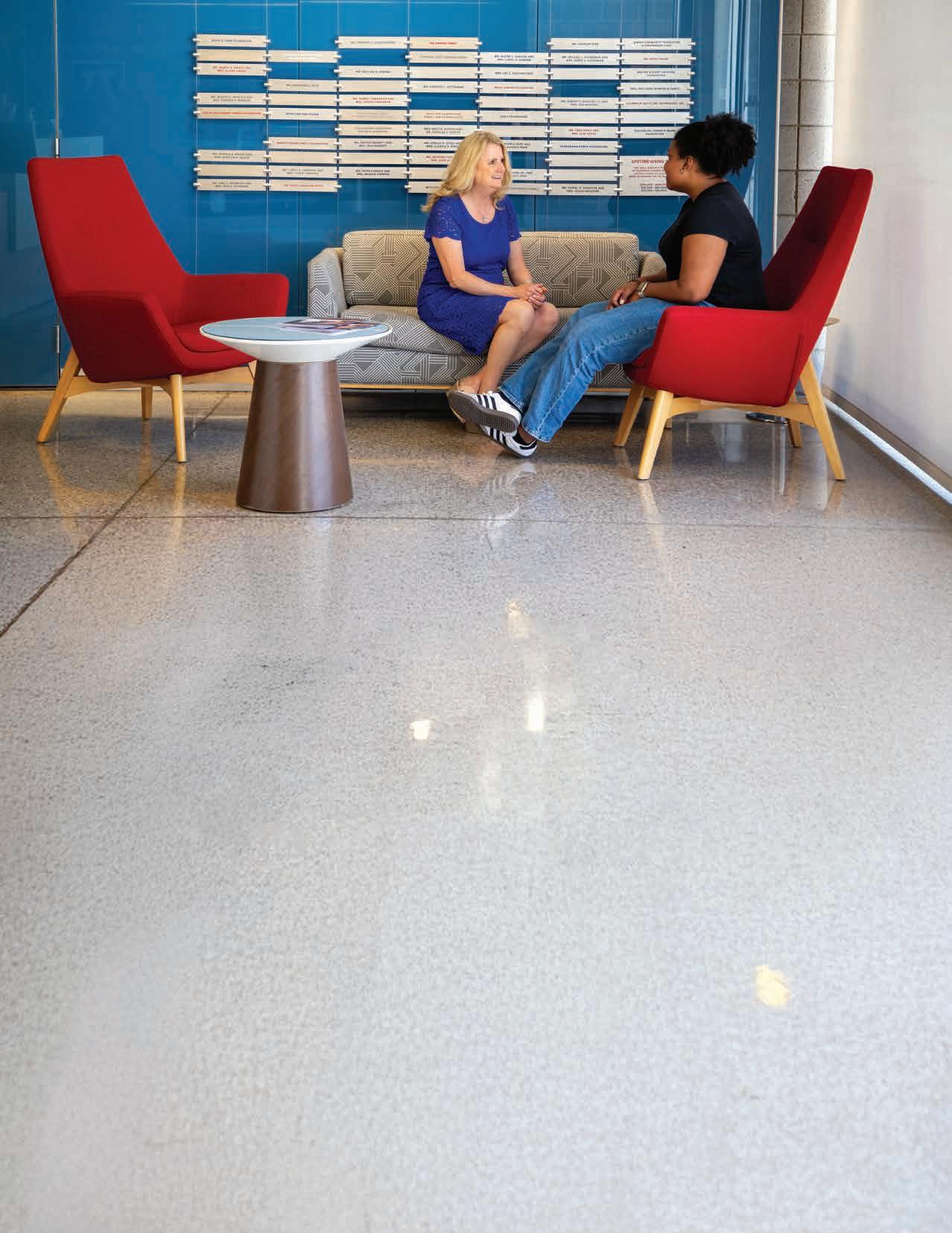
LEVEL 2
Independently Practicing Self-Advocacy (College/Emerging Adult)
LEVEL 3
Advocacy and Self-Authorship (Adulthood)
Level 1: Emerging Self-Advocacy (High School Age)
Before students can independently advocate for themselves, they need to understand who they are as learners, so the focus is on building awareness and practicing with support. Families support this process in a number of different ways:
Encouraging self-awareness:
Families and educators help students understand their learning differences, strengths, and challenges. Students begin to participate, and even lead, 504 or IEP meetings, and practice discussing their diagnoses honestly, rather than being kept from their information.
Promoting trial and error:
Allowing students to try, and sometimes fail, is how they learn. If the adults can avoid stepping in too quickly, this allows students to build their sense of competence and confidence.
Modeling communication:
Students are practicing conversations with teachers or peers with trusted adults. We help them practice by asking questions that guide and help them prioritize important tasks.
Supporting exploration:
Families help their students discover what learning strategies work best for them and connect them with communities that can understand them, such as advocacy groups.
These skills don’t disappear in college—they evolve. Students may still need reminders and encouragement to use these strategies as they enter Level 2.
Level 2: Independently Practicing Self-Advocacy in College
College marks a shift: students are now legal adults and expected to advocate for themselves. Families and supporters are fading into a more supportive role as their students take the lead in communicating with staff and accessing accommodations. At this level, with the support of SALT Center staff, students are:
Practicing communicating needs:
Students must speak up in group projects, explain accommodations to peers, and advocate in housing or academic settings. They often practice with their specialists about how to structure their conversations with professors or how to draft professional emails.
Building learning partnerships and other relationships:
Through relationships with their peers and their support professionals, they are continuing to build their awareness of their strengths and challenges, as well as becoming more aware of the types of supports that are most helpful.
Navigating challenges:
Whether it’s emailing a professor or discussing strengths in a job interview, students are practicing flexibility and problem-solving daily. Only through navigating challenges can students build the resilience needed to persist at the university.
Families and support professionals continue to cheer for their students’ effort and progress and help them to reflect on what is working.
Level 3: Looking Ahead to Life After College
In adulthood, self-advocacy becomes more nuanced. Students transition into self-authorship, where they define their own goals, values, and needs. We strive to see students engaging in:
Working partnerships:
Advocating in professional settings and managing new challenges.
Ongoing self-assessment:
Understanding when and how to ask for support.
Empowered independence:
Navigating life with confidence and clarity.
Families continue to support this process by listening and encouraging, normalizing new challenges, and celebrating their students' autonomy. Self-advocacy is not a one-time skill—it’s a lifelong journey. By supporting students through each level, families and supporters help build the foundation for a confident, capable adult who knows how to speak up, seek support, and thrive.
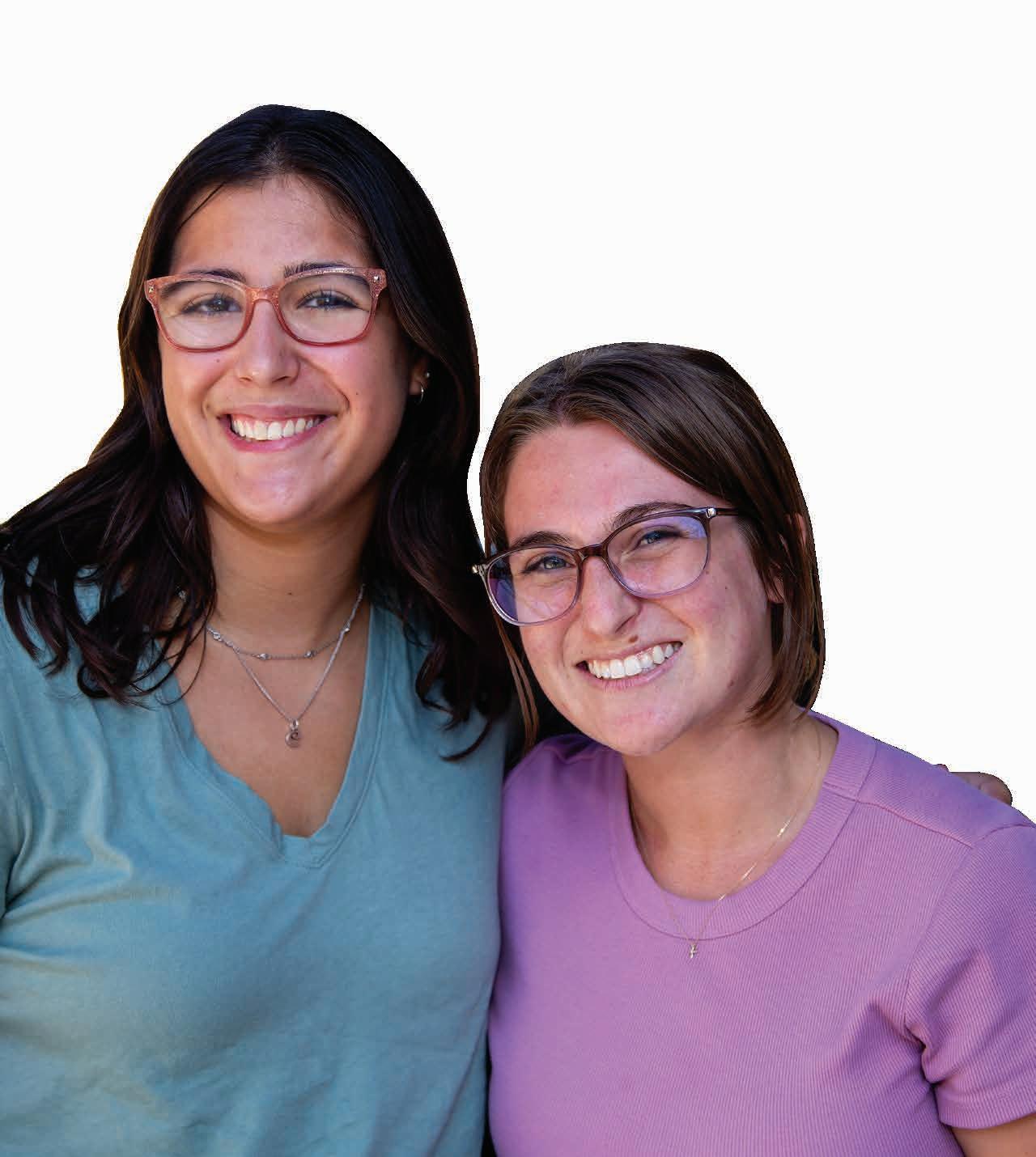
COURAGE AND COMMITMENT:
MEET THE 2025 MICHELLE COMBS AWARD WINNERS

ISAAC FLATER Marketing Specialist
Clara Jaffee
When Clara Jaffee arrived at the U of A from Florida, she immediately immersed herself in a myriad of activities and opportunities that captured her interest. As a 1st year student, Clara’s dorm was a designated “Outdoor Adventures Living Learning Community’” affording her opportunities to explore and learn about unique natural sites across Arizona and beyond. Whether it be paddleboarding in a lake, hiking in the mountains, visiting lush hot springs, or even taking a yoga class with goats, Clara has been open for it all!
To finish off her first year at the U of A, Clara’s insatiable thirst for adventure took her abroad where she spent a month over the summer in Verona, Italy, taking a hands-on Nutritional Sciences course, exploring Mediterranean cuisine and agriculture.
Jennifer Hansen, Clara’s Student Support Specialist at the SALT Center remarks, “One of the things that continues to impress me about Clara is that she has embarked on many of these excursions on and off campus, even if she doesn’t know anyone else that is involved. This takes a lot of courage for a 1st year student who is living so far from home. Clara has a positive mindset and shows up because these activities and opportunities are interesting and important to her.”
Aside from her whirlwind travels, Clara is equally committed to her studies and giving back to the community. She works off-campus as a gymnastics coach for young children and spent last spring volunteering as a student aide in a local kindergarten classroom. Clara also recently began a position at the SALT Center as a Peer Mentor, where she hopes to connect with other students to help them be courageous, curious, and seek out new opportunities.
Clara says, “The SALT Center is my favorite place on campus. I’ve made friends just by sitting in the student lounge. I go to all the events.” She adds, “Even though I’m very far from home, I can still go to my Support Specialist, Jennifer, when I need anything. It’s my little safe space here.”
Clara was recently admitted into the Honors College and is working toward her goal of completing a degree in Early Childhood Education, a path that seems a logical fit for this caring, adventurous and unique young woman.
Natalie Hurtado
Natalie Hurtado is a senior in the Eller College of Management, majoring in Marketing. Over her college career, she has won numerous case competitions, excelled academically as a part of the W.A. Franke Honors College, and been very active on campus and in the community.
Natalie is grateful to her Student Support Specialist, Lupe Thompson, for helping her navigate university life and explore opportunities that have helped her grow and develop.
Natalie says, “Nearly 10 years ago, I learned of the SALT Center and knew I would find people who would help me be successful in my collegiate studies; however, what I didn’t know then was that the SALT Center would give me so much more than just tools to help my education.”
She continues, “Lupe is the reason I am able to do what I love every day for work as a member of the SALT Center marketing and communication team. My parents have even bestowed the nickname ‘Mama Lupe’ to her - and it’s fitting to say the least!”
Lupe helped Natalie learn about and prepare for her marketing job, a position that allows her to directly apply the skills she is learning in the classroom, all while giving back to the program that has been critical to her success. Lupe also helped Natalie prepare for her last campus job with the U of A’s Disability Cultural Center, where she helped students with disabilities feel welcome and conducted presentations on ableism and disability rights.
In her spare time, Natalie runs half marathons, bakes, and operates a digital shop on Etsy. She is also a talented photographer and uses that skill to benefit the SALT Center, as well as the occasional wedding or college graduation. She also works with high school students as a leader with Young Life and recently travelled to Costa Rica as part of a service trip.
Lastly, Lupe Thompson notes that, “Natalie is an incredible advocate for herself and others. She meets with every professor and explains her learning challenge and needs. She follows up if she is having difficulty. Her spirit is unquenchable, her goals are wonderful, and her energetic personality is unparallelled.”
Michelle Combs Award:
Each year the SALT Center awards two exceptional students with the Michelle Combs Award. Michelle was a U of A student who passed away in a tragic motorcycle accident in 2005. Her family and friends created the award to honor her memory and recognize other students at the SALT Center who share Michelle’s adventurous, energetic, and goal-oriented approach to life.
To learn more about Michelle’s inspiring life, past award winners, or how to contribute to the Michelle Combs Endowed Fund, please visit salt.arizona.edu/michelle
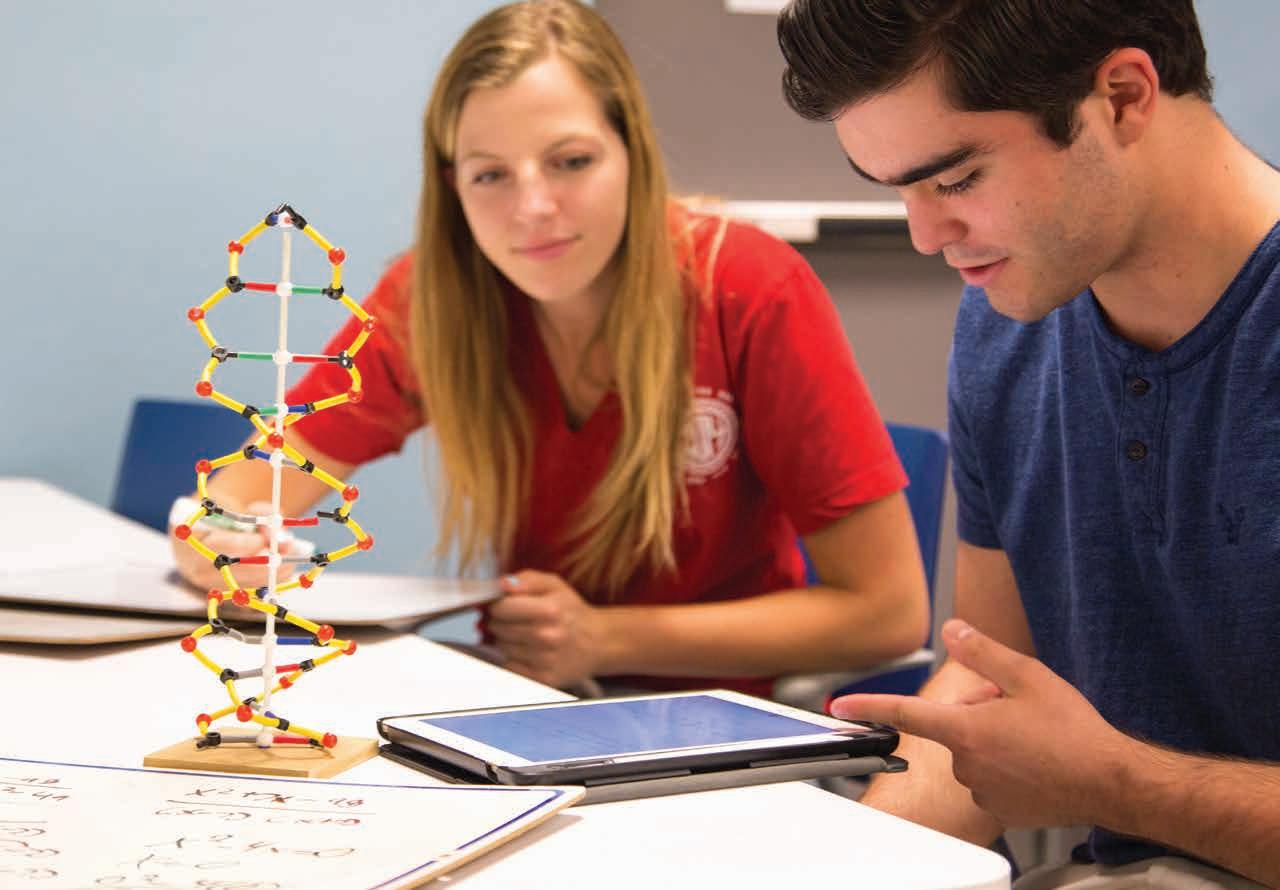
PASSING THE TORCH:
A TUTORING PROGRAM LEAD BY THOSE WHO'VE BEEN THERE
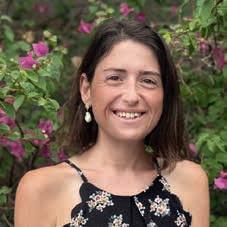
SARAH KIRSHBAUM
Learning Support Services, Coordinator
“Do I belong here? Am I smart enough? Am I prepared for college?” Imposter syndrome is real. The transition from high school to college is a scary one. Sometimes it feels overwhelming and hard to grasp. As a former SALT Center student myself, I remember looking at my new adventure and questioning if the long winding road was achievable and worth it. I remember being in classes where the professors spoke at the class instead of engaging us. I remember wondering if I was doing something wrong or if I was in the wrong place, until I found a community of support and understanding at the SALT Center.
Understanding this mindset is foundational for our tutors in the SALT Center. I train all the new tutors to understand the mindset and struggles that a lot of students with learning and attention challenges have. My tutor training focuses on engagement strategies that support our students to build skills in self-advocacy. This means the tutors support the students in learning what they need to be successful and how to express these needs in a way that will help them achieve their goals independently of the tutor. The most common form of teaching that we experience is lecture. I noticed through observation that this led to our tutors defaulting to lecturing our students. Our students do not need another lecture. Our tutors are taught to instead focus on providing engagement opportunities for our students to express their knowledge. I consistently remind our tutors that they are not professors or a textbook; they are peer tutors. It is their job to engage our students in the content, incorporate learning strategies that the students can utilize when studying alone, and help our students build the confidence in their own skills and knowledge so that the students can study efficiently and effectively.
During my educational journey, I had tutors who spoke at me and I sat there and counted down the minutes. They did not listen or care about my questions or needs. I do not want any of our students to experience this. They should leave a SALT Center tutoring session feeling confident about the learned content, a list of strategies or techniques that they can implement on their own, and an academic plan for next steps. Our sessions should be a collaborative effort of knowledge exchange, not a knowledge dump from tutor to student.
Aria Spaulding, a former student in the program and a Lead Tutor shared here experience saying, “The SALT Center tutoring gave me a strong foundation, not only in academics and professional skills but also in my confidence and independence.” As a peer tutor and student, Aria was able to empathize with her students by creating a collaborative session that focused on growth rather than just support.
A priority of training quality tutors is an involved and engaging training program. During my time at the SALT Center, I have developed the Lead Tutor Program. I have designed this program to provide consistent and personalized feedback to our 100+ tutors. I work with 13 lead tutors who each have a team of 7 new tutors. I had the privilege of watching Aria grow professionally through her time as a SALT Center student and Lead Tutor. As a Lead Tutor she had the opportunity to take more responsibility by mentoring our new tutors and shaping the program’s tutoring practices.
Aria expressed, “I absolutely loved being a Lead Tutor as my professional skills improved tremendously. This role taught me leadership, organization, and teamwork skills, while also pushing me to think critically about how different students learn best.” This program focuses on encouraging our tutors to grow by reflecting on their own skills and observing others. Through bi-weekly mentor meetings, our tutors create goals that help them become stronger tutors who focus on engagement and long-term retention rather than just assignment completion.
Lately, we have seen a rise in Artificial Intelligence (AI) usage leading to a reliance and learned dependance. AI can be a useful tool when used correctly however it cannot replace learning all together. Aria said, “While AI can be a helpful tool for brainstorming, creating quick study guides, or rephrasing class material, it lacks the personal connection and tailored guidance that tutoring provides. Tutoring gives students a safe space to ask questions, make mistakes, and receive feedback on material that is specific to their class studies— something AI cannot do.”
This personal connection is the point! Tutoring should provide opportunities for students to express their knowledge and challenge their understanding of the content. She continues, “Students also gain confidence and accountability from working with a tutor, which are essential skills for success both in and outside of the classroom.”
The SALT Center’s goal for all the services we provide is that the students leave our program with a strong sense of self. This confidence will transfer to success in their future goals and career. Understanding what one needs to succeed and being able to express those needs is essential and we at the SALT Center are excited to support this journey towards professional and personal success.
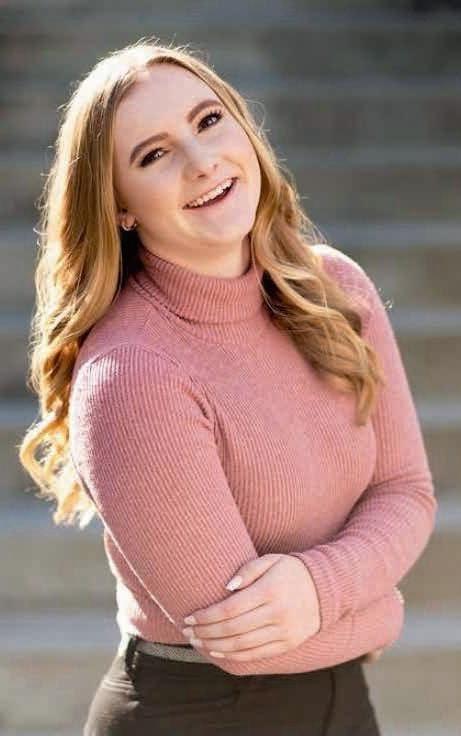

Photo courtesy of Aria Spaulding
EMPOWERING POTENTIAL:
THE CRITICAL ROLE OF SCHOLARSHIPS FOR SPECIAL EDUCATION STUDENTS WITH FINANCIAL NEED
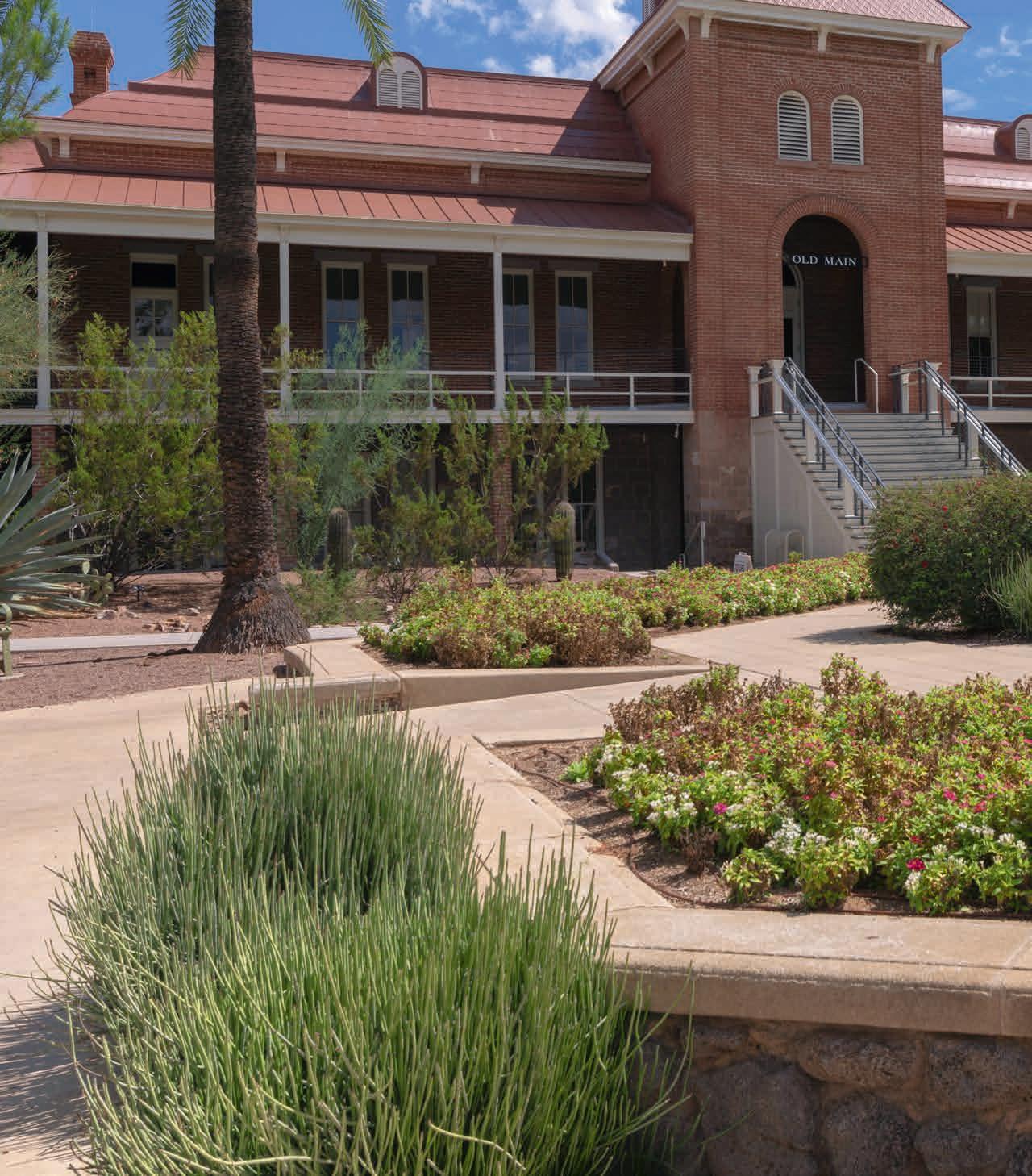
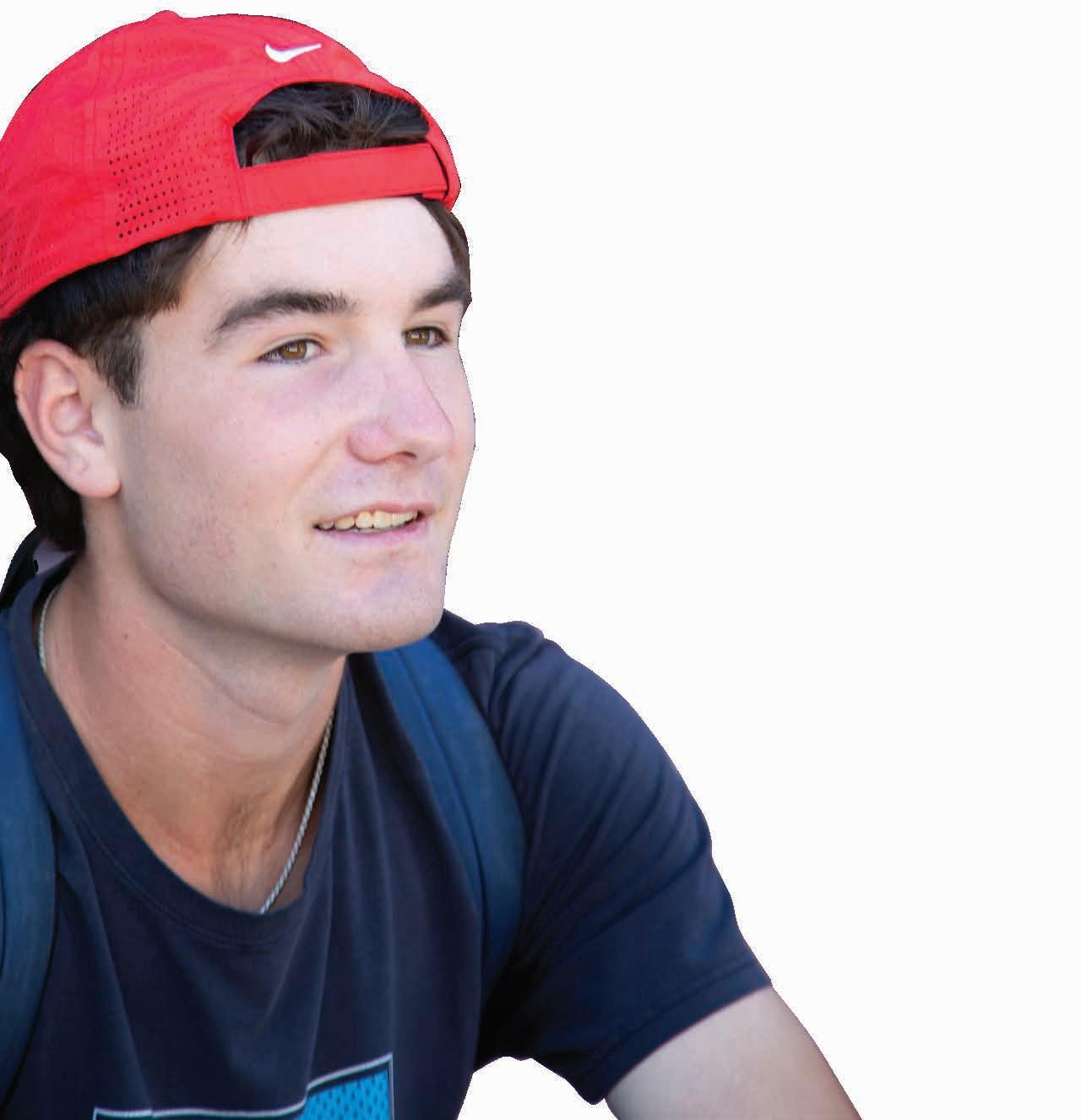
DANIEL LINDEN, III Director of Student Support Services
In the pursuit of a college degree, students who have learning differences face a unique set of challenges that extend beyond the classroom. Whether they come from public, private, or charter schools, learning challenges can become a barrier to academic success and, often, students need personalized assistance to meet the U of A’s academic performance standards; the kind of assistance they can get through the SALT Center.
But what happens when students who need the kind of personalized support the SALT Center offers cannot access it because of limited financial resources?
Thanks to incredibly generous donors, scholarships to offset SALT Center fees are available to students who need them. These scholarships are more than just financial support. They are often a lifeline that helps students realize their dream of a college degree. They truly change the trajectory of lives. By alleviating financial stress, scholarships allow students to focus on their studies, participate in campus life, and pursue internships or research opportunities that enhance career readiness.
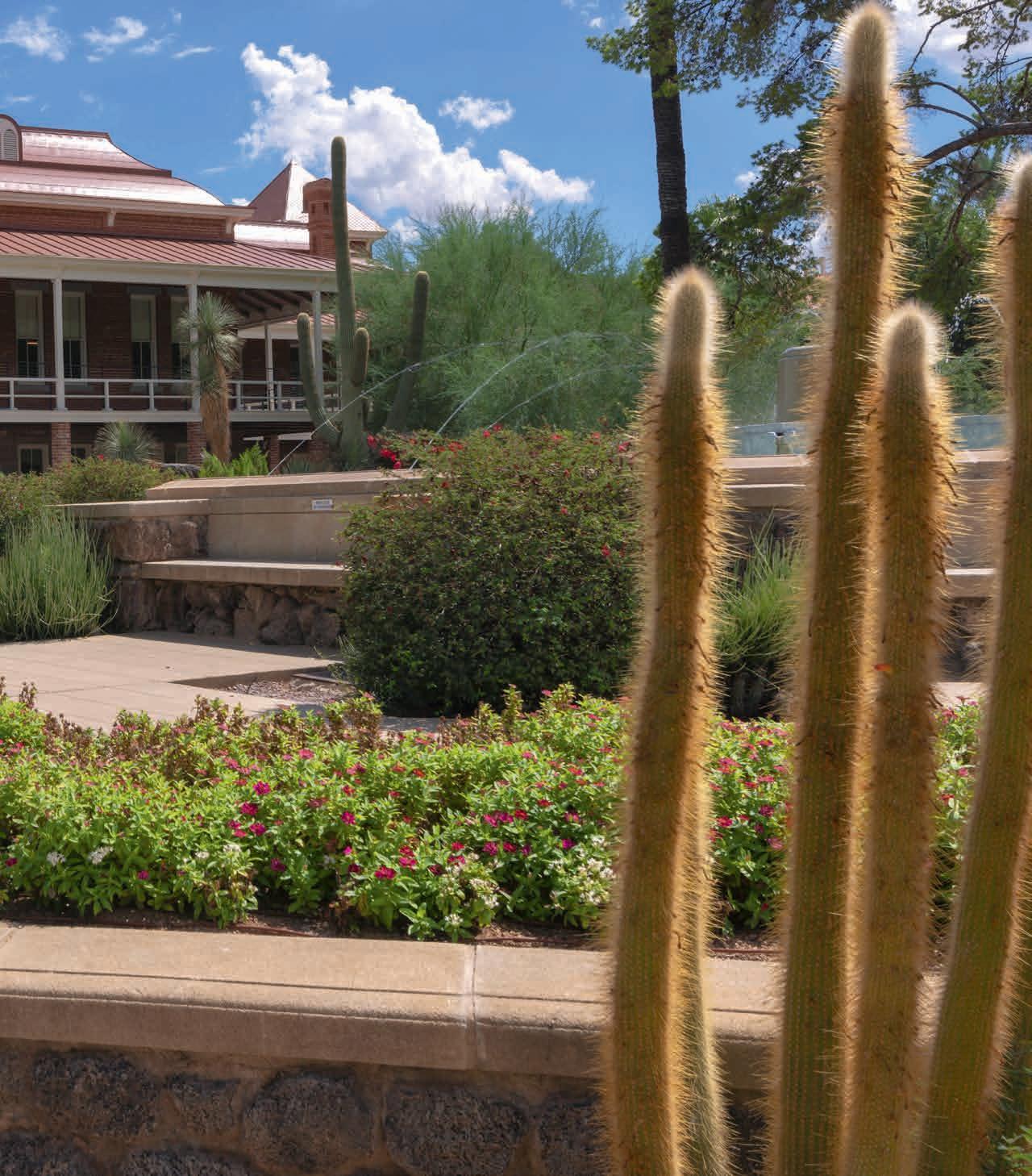
They also send a powerful message: students who learn differently are valued, capable, and deserve investment. Students participating in the SALT Center bring resilience, creativity, and determination to their academic and professional pursuits. They also build leadership skills by becoming Peer Mentors, SALT Center Student Ambassadors, participate in study abroad programs, research, and participate with confidence in any one of a number of activities available through the university. Again and again, we see that they graduate and become leaders, advocates, and changemakers in their fields. Many of their stories are highlighted in this journal.
We are very proud that for the 2025-2026 academic year, the SALT Center anticipates providing roughly 60 needbased scholarships equating to over $280,000 toward SALT Center program fees. By expanding access to the SALT Center, here at the University of Arizona, these scholarships help build a future where every student, regardless of ability or income, has the chance to reach their fullest potential.
If you want to help support a student who has financial need, please visit: salt.arizona.edu/give
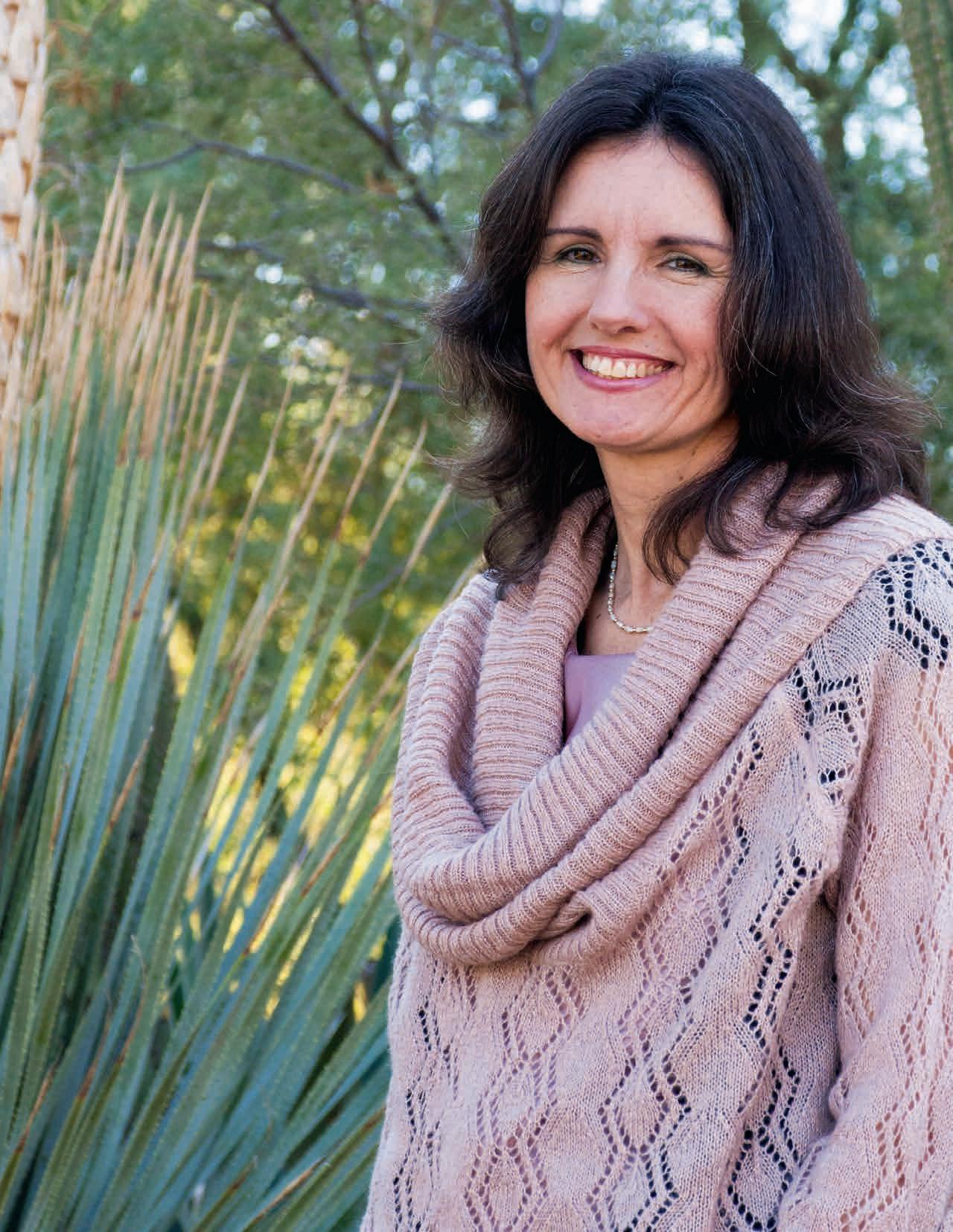
EXPLORING EDUCATIONAL TECHNOLOGY WITH MARY BETH EUSTICE
ISAAC FLATER Marketing Specialist
As time progresses, computers and other digital technologies become increasingly important to the way the world operates. For people with learning differences, these innovative technologies can be both overwhelming as well as exciting tools to help us be more effective. At the SALT Center, we recognize the pros and cons posed by the latest technological innovations and strive to help students navigate them in a way that works best for their individual needs.
Since 2013, Mary Beth Eustice has served as the SALT Center’s dedicated educational technology specialist, working to train students, tutors, and staff to become familiar with the best digital tools at our disposal.
At the start of each semester, Mary Beth hosts a series of “Gear Up” workshops to help new students hit the ground running.
Mary Beth explains, “College students often find themselves ambushed by due dates and unread emails. Digital organization is critical to success. Our Gear Up workshops teach students how to transform their laptop into a productive workspace. Gear Ups show students how to set up course folders, transfer due dates to their Outlook calendars, bookmark campus sites, organize their university email, and navigate Brightspace (the U of A learning management system).”
After those workshops, students are encouraged to schedule one-on-one appointments with Mary Beth to explore other tools which can help them with their classes and organization. These include things like:
Note Taking & Reading Apps
AI Tools
Mind Mapping
Digital Organization
Installing useful software licensed through the university
Navigating U of A online platforms such as Brightspace, TracCloud, & Zoom
Mary Beth can also train students on how to access and operate some of the technology that is integrated into our learning spaces at the SALT Center. These include things like our Collaboration Stations, Tech Bar with options for dual screens, and our 3D touchscreen.
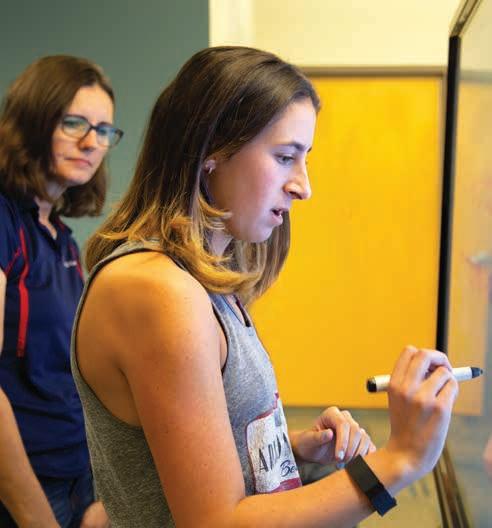
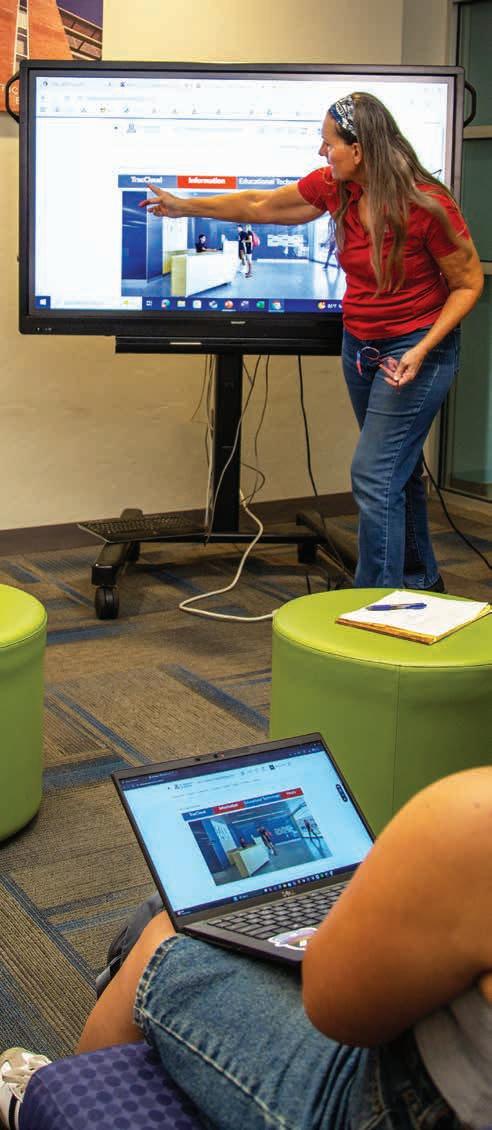
MARI WHITE:
2025 DAVID LIVINGSTON WHITE AWARD WINNER
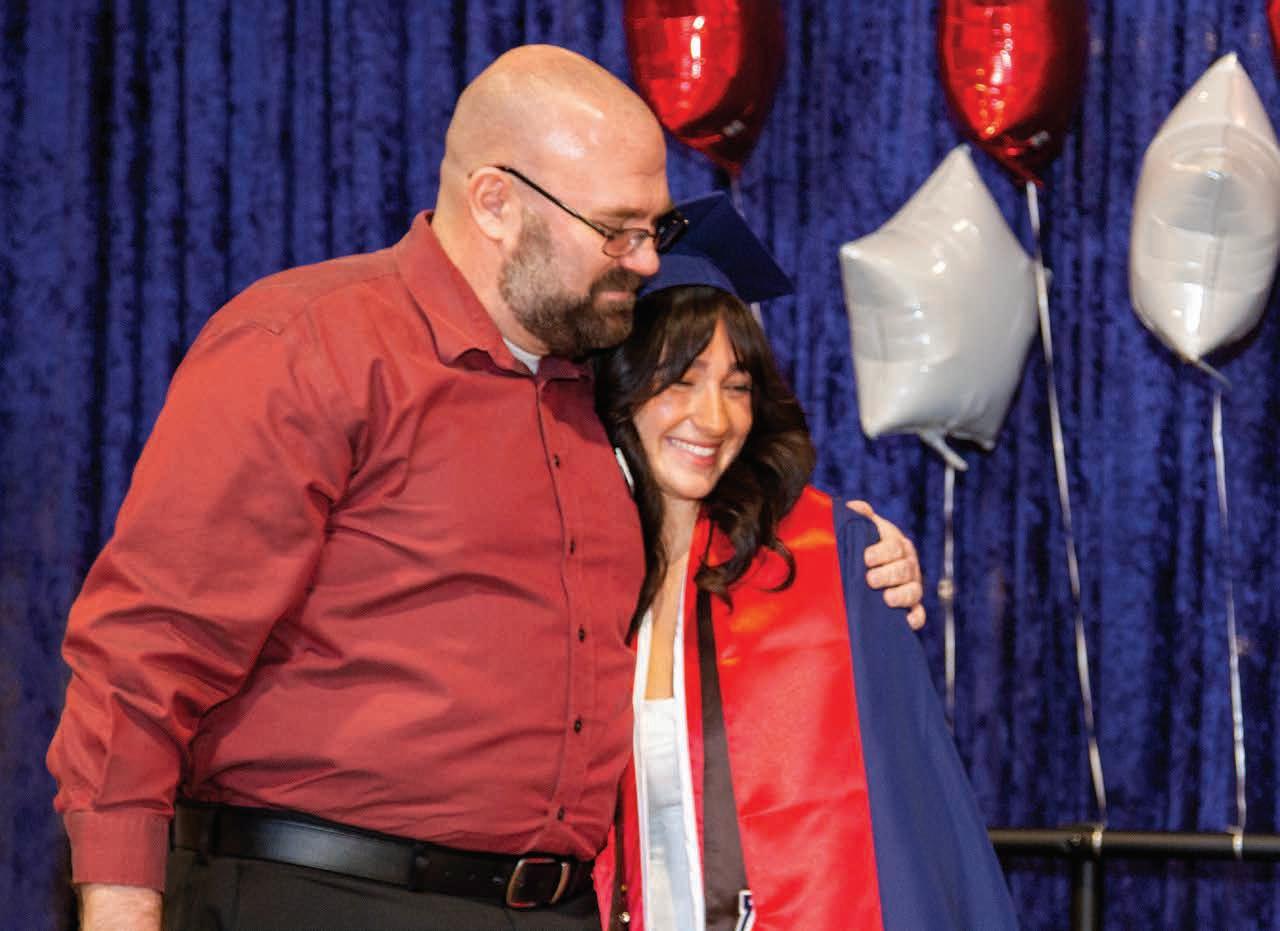
ISAAC FLATER
Marketing Specialist
RICHARD ST. CLAIR
Student Support Specialist
Mari White has demonstrated her perseverance since the earliest days of her education. She started elementary school with undiagnosed learning differences which caused her to fall behind her classmates. Even though she struggled with bullying and her own self-confidence, by the time she was finally diagnosed with dyslexia in the 6th grade, Mari had already started to advocate for herself and her needs as a learner. In fact, she was the one who first recognized the signs of dyslexia in herself and pushed her parents to get her tested.
From there, Mari continued to blossom, both in the classroom and her community. In high school, she was the founder of the Hiking Club, a member of the Key Club, and National Honors Society. After school, Mari could always be found at the local ballet studio doing intensive training for several hours, nearly every single day. When she turned 14, Mari was invited to dance for the prestigious Pacific Northwest Ballet School, where she continued to train at the highest level until her graduation at the age of 18.
When Mari came to Arizona, she brought her work ethic and passion with her. Throughout her 4 years, she was highly active in the SALT Center, the U of A, and in the local community working and volunteering with numerous departments, clubs, and community organizations. On top of all that, she even made some time to drop in on the occasional open dance class once or twice a week.
Despite temptations to take the easier route, Mari always pushed through, relying instead on her hard-earned skills and values such as time management, motivation, attention to detail, and a willingness to make personal sacrifices. She always set her goals high and held herself to her own standards, never accepting anything less than her all.
Richard St. Clair, her Student Support Specialist at the SALT Center, said of her, “Mari is extremely resourceful; she makes use of every opportunity to challenge herself and to be more than she was yesterday. Her use of the SALT Center has been relentless, leading her to academic distinction and feeding her desire to learn and grow as a person. She puts herself out there and exposes herself to so many different activities and struggles, that her tools for success are formidable.”
Mari also credits Richard’s support with helping her go the distance. She says, “Richard gave me so much confidence and helped me learn to trust and believe in myself.” She continues, “I tried to write him a thank-you card, but I actually had to end up writing a three-page thank you, and I just kept going, and going, and going, because, really, I don’t think my college career would have been the same without him. He kept me on track and helped me keep a positive mindset which was so important.”
Mari recently graduated in May of 2025 with an impressive 3.9 GPA and was honored at the SALT Center’s spring graduation reception with the David Livingston White Award in recognition of her formidable spirit of determination. Since then, Mari has remained in Tucson as an AmeriCorps volunteer and is preparing to take the LSAT next year with hopes of advancing into law school.
Richard recalls, “From the moment I met her, Mari's mantra has been: ‘I can do that.’ She can, and she does.” We know Mari will continue to do whatever she puts her mind to, and we wish her best of luck in her future endeavors.
David Livingston White Award:
Each year, the SALT Center selects a student to receive the David Livingston White Award. Recipients demonstrate exceptional perseverance and determination while pursuing their academic goals. This prestigious award honors the man for whom it is named.
David Livingston White graduated from the University of Arizona at the age of 73. He obtained his degree in 2011, and never lost sight of this goal even though he battled cancer for many years. Upon graduation, David’s siblings purchased a class ring for him. The ring was the perfect way to commemorate David’s accomplishment. When David passed away, his family generously established an endowment in David’s name to support SALT Center programming. Each year, a portion of the funds are also used to purchase a class ring for one graduating student who has demonstrated extraordinary perseverance. The SALT Center is grateful to David’s family, and we are honored to recognize Mari White as recipient of this award for 2025.

Photo courtesy of Mari White

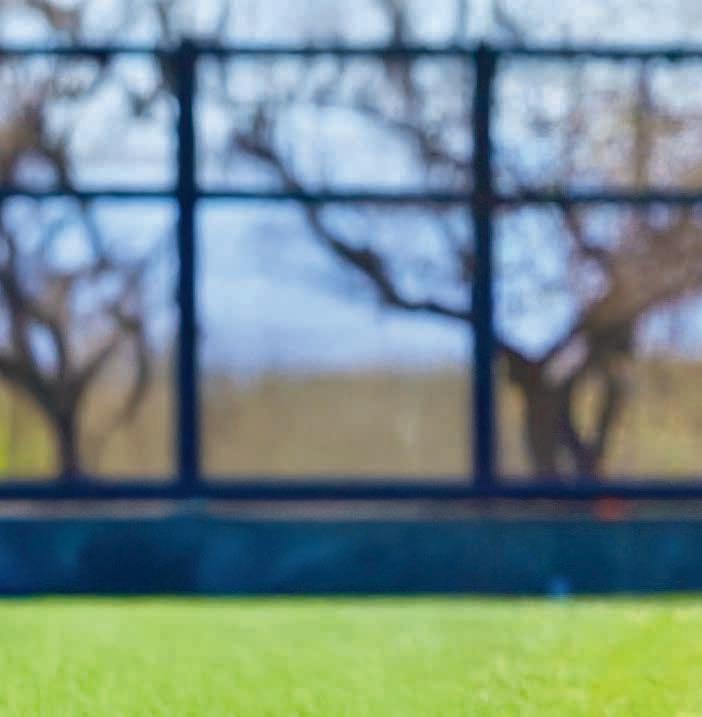
PUSHING FORWARD:
GABBY’S JOURNEY ON AND OFF THE FIELD
MARCELA DELGADO Director of Operations & Strategic Affairs
Chaotic, athletic, nerdy, learning-challenged, queer, competitive, and disabled. Those are the exact words that Gabriella Sheffield uses to describe herself these days. What you’ll also learn from speaking to her is that she loves to hit people, hard.
A current third-season U of A Women’s Rugby team forward, Gabby doesn’t shy away from saying that she is always happier when she is competing in high impact sports. She learned all about competition and resiliency when she was a freshman at Lewis and Clark High School in Spokane, Washington. “I had always played it safe,” she says about that time in her life. She knew she wanted to play the safety position on the football team, but there was no precedent for females to join. That didn’t stop her from trying out and subsequently getting the school district to formally change the rules to allow women to play. “None of the boys talked to me for the first three months, until finally one asked me to get him some water, and the other told me that girls shouldn’t be allowed to play.” None of that stopped her. She graduated after playing for four years on the team, making her mark as the first woman in a 100-year old football program to do so. Today, football is now a co-ed sport in her hometown, and she knows of five other women who have followed her path.
Three years into her experience at the University of Arizona, Gabby continues to see rugby as her “built-in way to interact with people and show courage.” Rugby makes her so happy, that despite the time commitment and sacrifices, she says it is entirely worth it. She has practiced how to manage her priorities with the help of her SALT Center Student Support Specialist, Lupe Thompson. “I chose the SALT Center because I saw myself in the students, and I knew that I needed a place that specialized in teaching me how to best learn.” Gabby knew that she would need to find a way to work with her anxiety and OCD, both of which she was diagnosed with her senior year of high school. “I started experiencing tremors, I couldn’t even tie my shoes, couldn’t take my AP tests, and my entire learning process was affected.” This is when she received an additional diagnosis of Myoclonus-dystonia syndrome, a rare movement disorder characterized by involuntary muscle jerks and muscle contractions.
Gabby’s experience with doctors not being able to give her clear answers regarding her disability created a sense of empowerment in her. Gabby is now on track to graduate next year with a degree in Neuroscience and Cognitive Studies and is routinely recognized as one of our frequent 4.0 GPA students. Gabby picked this academic track because of her own medical journey and wants to help others find answers that she struggled to get herself.
Gabby says the SALT Center has been a critical component of her academic success. Her relationship with Lupe is so important that she considers her someone that she can fall back to when she needs to work through tough things.
“Our relationship has meant the world to me, Lupe is always in my corner and makes me feel less homesick when I’m 1,500 miles away from my family.” Lupe has worked with Gabby for two years now, and has been consistently impressed by her academic resilience and personal drive. Lupe remarks, “Gabby demonstrates both mental and physical toughness and balances a demanding schedule with grace, courage and composure.”
Gabby’s love of learning has also translated into a love of teaching. She has been an Undergraduate Learning Assistant for a calculus class where she gets to help other students from the SALT Center and says the opportunity is so rewarding. She never thought that her early struggles with math and science would find her here, teaching others how to learn and aiming to pursue medical school in the future. Gabby also has hopes to travel back to a community in Brazil where she would like to use her language and STEM skills to do research on rare neurological disorders.
Gabby’s success can’t be described without mentioning her family. Her parents, grandparents, and siblings are at the center of her world, “My mom exemplifies self-advocacy. She has always helped me with my medical and educational needs.” This is the same mom who attempted to bribe her to not join the football team back in high school, “My mom wanted to buy me two pairs of Lululemon pants if I would agree to not join!”
Needless to say, Gabby has proven to her family, hometown, and U of A community that you can persevere and overcome obstacles by believing in yourself and your abilities. We are so proud of all Gabby has accomplished and look forward to what she will accomplish next.

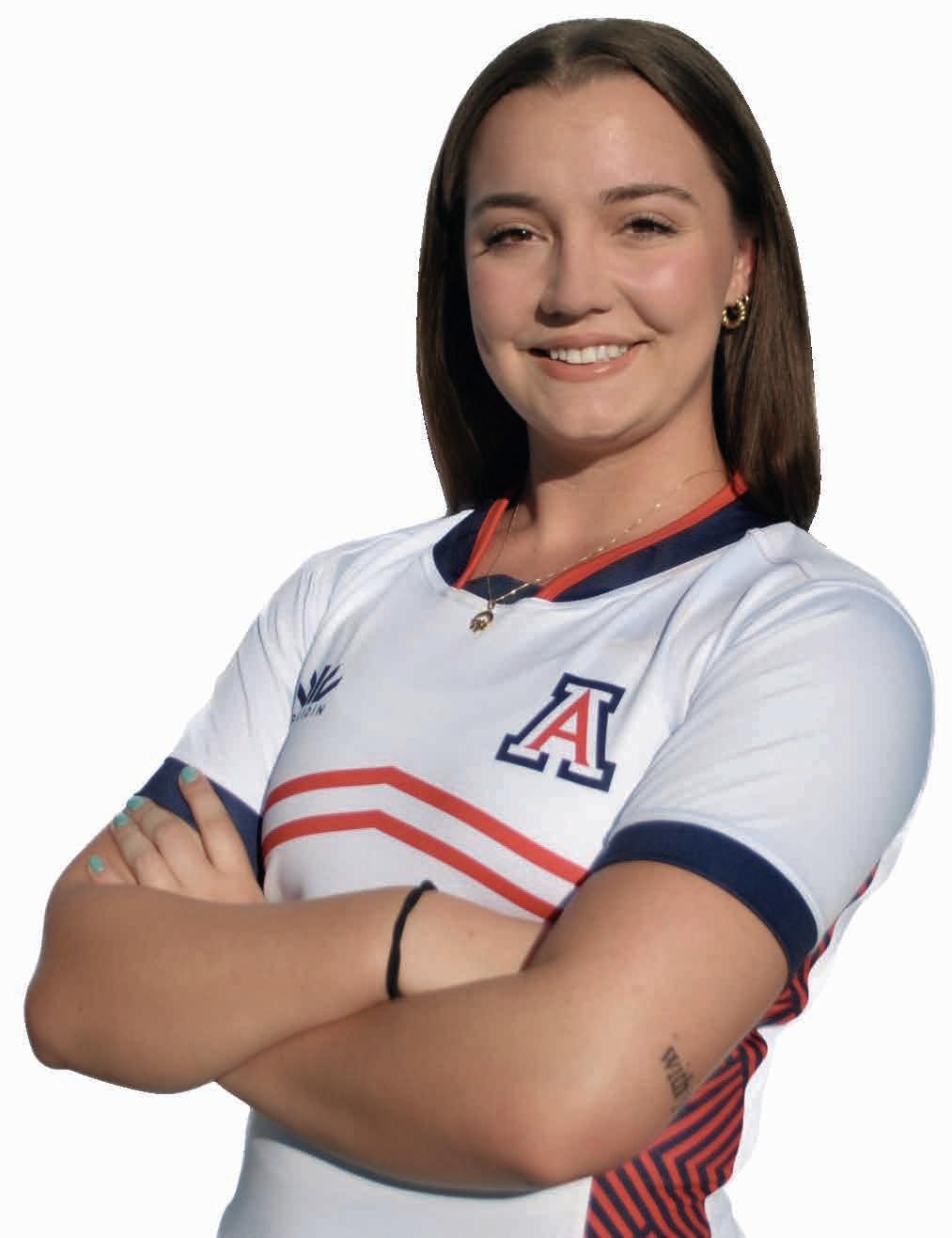
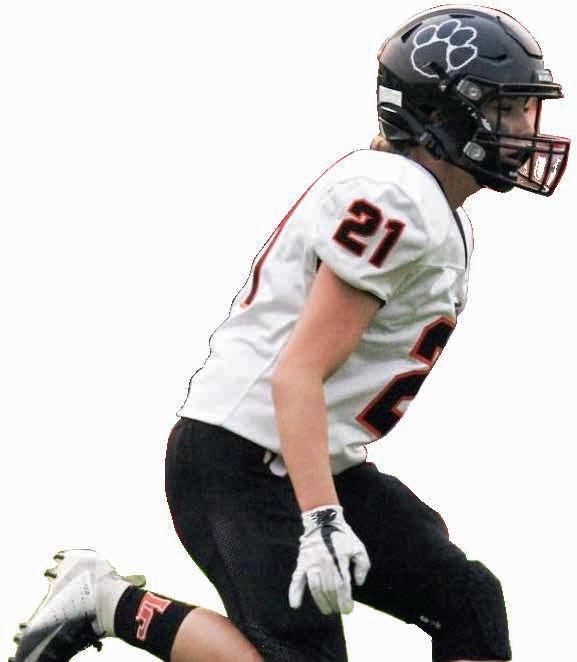

Photos courtesy of Patrick Mulligan, Callie Andrews, and Matthew Sheffield
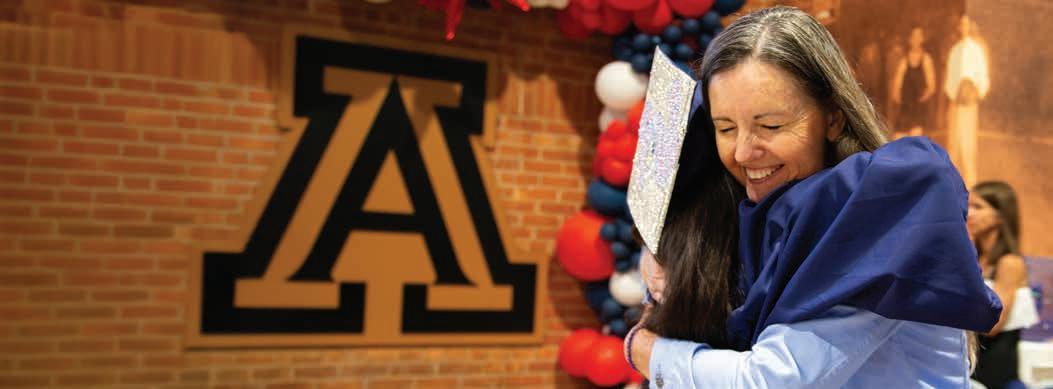
CELEBRATING THE CLASS OF 2025:
PHOTOS FROM OUR SPRING GRADUATION RECEPTION
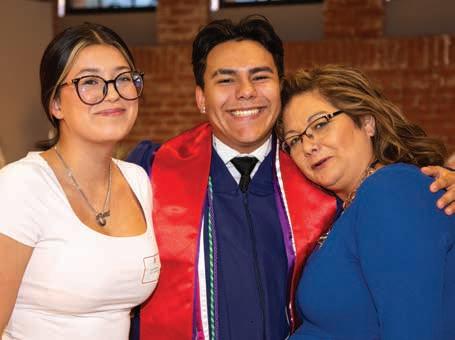

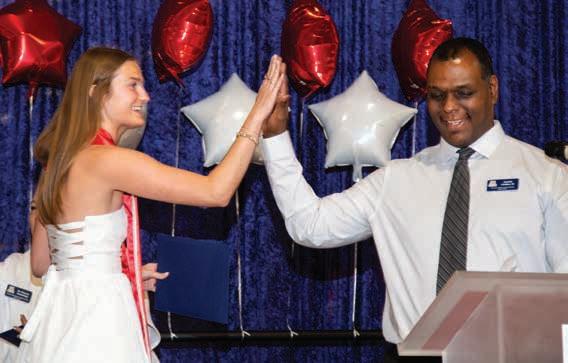
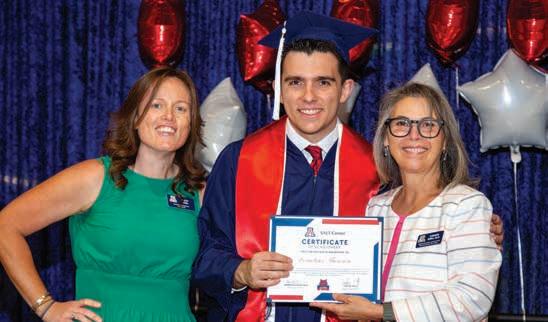
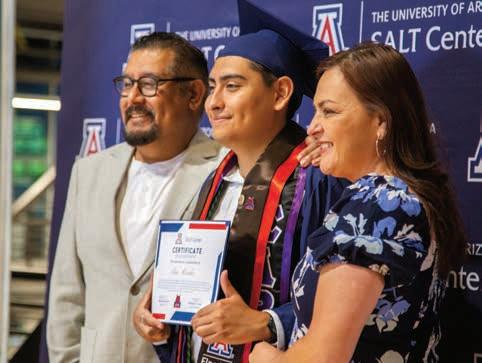
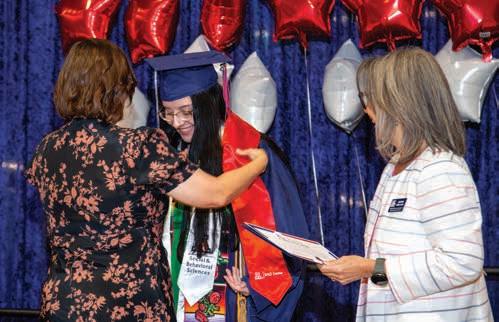
FIGHTING FOR MYSELF:
BAILEY HENNESSY’S GRADUATION MESSAGE
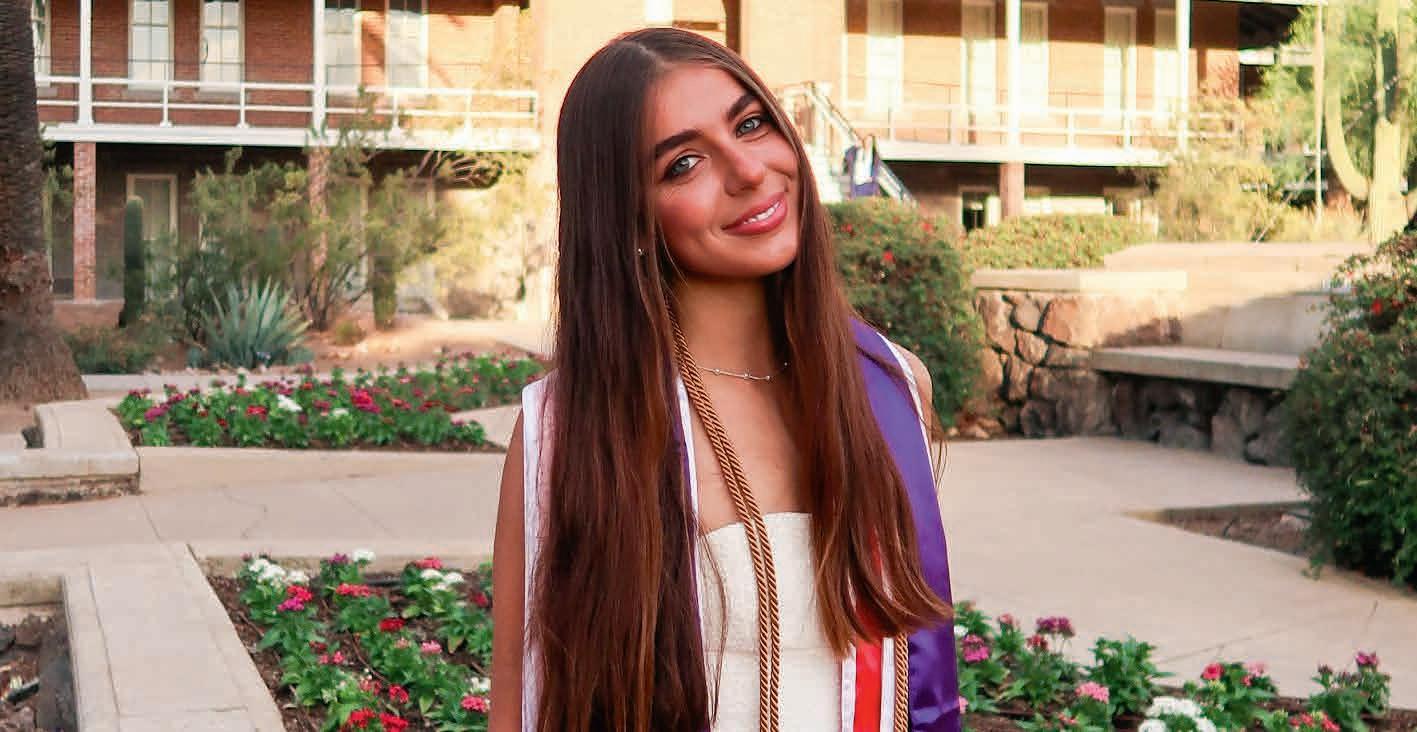
BAILEY HENNESSY
Class of 2025
Hello everyone. This is a huge accomplishment, and I hope you can all take a second to feel how proud you should be. Getting to this point took strength, grit, and heart. I want to tell you about my journey because if you had asked me a few years ago if I'd be standing here today, I would have said, "Absolutely not!"
I started college feeling very lost and I began to start failing some classes and just not doing well. I had no motivation, no direction, and school kind of felt like something I just couldn't handle. And instead of trying, I kind of gave up on myself. So, my mom wanted me to take some classes at Pima [Community College], hoping things would be different. It wasn't. I was still struggling, skipping class, not doing assignments, and avoiding the real issues. I felt disconnected and hopeless.
And then things got even worse. My advisor told me I wouldn't be able to graduate. That moment hit like a brick. Everything was coming down around me. I was exhausted. I felt like I had no options left, like I was watching everything fall apart and I couldn't stop it. And I looked around me and I thought, "Am I the only one? Am I the only one that can't figure this out? Why me?"
And then something shifted. I stopped and asked myself, "Why was I letting this happen? Why was I afraid to try?" That night I broke down. It was one of the lowest points of my life, but it was also a huge turning point because, for the first time, I chose to face it. I stopped hiding from the real reason I was failing, and I started fighting for myself. And I couldn't have done so without the support from the SALT Center and from my family.
The SALT Center changed everything for me. They didn't just help me with academics, they helped me rebuild —rebuild myself. They helped me work through the anxiety, the fear, the burnout. They gave me structure, motivation, and most importantly, people who believed in me.
With their support, I didn't just catch up, I went all in! I took 19 credits, then 21 credits, then 19 credits. I was determined to prove everyone, including myself, wrong. I made the dean's list. I got organized. I found confidence. And once again, I found a joy in learning. I actually started loving school so much that I started missing when I couldn't go to class on weekends, something I thought I'd never say.
And now, I'm here, graduating, and I'm headed to New York City to work at a law firm, and hope to go to law school next year. And, I just wanted to thank Kim. Thank you for helping me find my strength and for showing me that I could do this. You gave me the tools to succeed and the heart to lead again.
And to everyone graduating today, I know the road wasn't always easy but look at us now. We made it, we pushed through, and we graduated. Congratulations again, we did it!
Bailey delivered the above address at our May, 2025 Graduation Reception. We were so impressed by her inspiring story that we asked if we could share it in the Journal. You can also view a video recording online at youtu.be/D3AmTZJOXc4 or by scanning this QR Code:
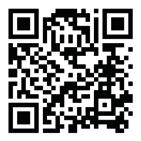
Photo courtesy of Bailey Hennessy
The University of Arizona
Patricia A. Bartlett Building PO Box 210136
1010 N. Highland Avenue Tucson, AZ 85721-0136
